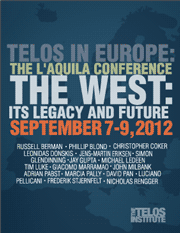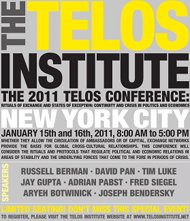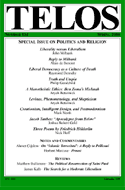By Marcia Pally · Wednesday, December 5, 2012 This paper was presented at Telos in Europe: The L’Aquila Conference, held on September 7-9, 2012, in L’Aquila, Italy.
 Whatever the ostensible theme of the September 2012 Telos conference, it seems the real one was the mess in the West. Has the West lost its pizzazz, gravitas, ability to guide? Have we become too secular, merely rational, and thus paradoxically ungrounded? Or are we not rational enough, our politics and economics still beset by emotional, quasi-religious beliefs? Whatever the ostensible theme of the September 2012 Telos conference, it seems the real one was the mess in the West. Has the West lost its pizzazz, gravitas, ability to guide? Have we become too secular, merely rational, and thus paradoxically ungrounded? Or are we not rational enough, our politics and economics still beset by emotional, quasi-religious beliefs?
From my perch, the West hasn’t lost anything but rather has gotten too much of what might be a good thing were there less of it. That thing is separability, and too much of it, untempered by situatedness, yields abandonment and anomie on one hand and selfishness on the other. Of course, too much situatedness would be equally damaging—oppressive and stultifying. It is the binary choice—separabilty or situatedness—that leads the West to the worst of itself. Thus what is needed are frameworks that foster the simultaneous presence of both. Here I’ll point to one, theologies of relationality.
Continue reading →
By Telos Press · Tuesday, October 23, 2012 The New York Times recently published a letter from Telos Editorial Associate Marcia Pally, who commends the paper for drawing attention to the work of “new evangelicals”:
Molly Worthen’s insightful review of “Moral Minority: The Evangelical Left in an Age of Conservatism,” by David R. Swartz (Sept. 30), is, I hope, the beginning of more coverage of the evangelicals who have left the right. Swartz’s fine scholarship illuminates a critical shift in our religio-political landscape: “new evangelical” activism in environmental protection, economic justice and immigration reform — a big change in where evangelical time and money are going. If we don’t read about changes like this, we accept old prejudices and remain blind to political realities.
Continue reading →
By Marcia Pally · Tuesday, February 8, 2011 An earlier version of this essay was presented at the 2011 Telos Conference, “Rituals of Exchange and States of Exception: Continuity and Crisis in Politics and Economics.”
 In light of the 2008 global financial crisis, a reassessment of the global market system seems to be afoot. If neoliberalism (too much market) yields the Great Recession, if socialist planning (not enough market) produced the failed economies of the former Soviet bloc, and if social-market combinations (too much centralization of the market) progress towards the slow economic growth and high-cost programs of Western Europe, what are better options? In light of the 2008 global financial crisis, a reassessment of the global market system seems to be afoot. If neoliberalism (too much market) yields the Great Recession, if socialist planning (not enough market) produced the failed economies of the former Soviet bloc, and if social-market combinations (too much centralization of the market) progress towards the slow economic growth and high-cost programs of Western Europe, what are better options?
“New evangelicals,”[1] perhaps unexpectedly for non-believers, offer a few ideas—interesting for their mix of market and common-good positions, and for an apparent paradox. “New evangelicals” work with a sophisticated notion of the common good—though their beliefs and practices rely on the very eighteenth-century principles that fostered unregulated market development. That is, they uphold unencumbered entrepreneurialism in markets, but this commitment makes them entrepreneurs for the benefit of others. This becomes more interesting when one considers that the “new evangelical” paradox has significant effect on the circulation of money and people worldwide. The material here is taken from field research that I did between 2005 and 2010 and which will appear in a book later in 2011 (Eerdmans Publishing).
Continue reading →
By Russell A. Berman · Tuesday, September 5, 2006 Despite the approaching mid-term elections and the criticism of the Bush administration’s conduct of foreign policy, the left—domestically and internationally—has had a hard time in articulating an alternative positive vision. “Not Bush” only gets you so far: sooner or later a substantive alternative is needed to give opposition credibility. Facing turmoil (to say the least) in the Arab and Islamic world, what foreign policy would be preferable? Evidence demonstrates that neither “UN” nor “EU” is a believable response. But the problem is deeper than the pragmatics of current diplomacy.
The left (and liberal) imagination would prefer to cast the confrontation with Islamic extremism or, yes, Islamic fascism, as a matter of imperialism and “anti-imperialism.” The terminology constitutes a treasured legacy of the left, not only from Lenin’s account of imperialism and capitalism (which then permitted him and his successors to mask Soviet Russian expansionism as somehow “anti-imperialist”) but also from a more honorable resistance in the US and Europe to imperial expansion of the late nineteenth century.
In the meantime, anti-imperialism is today’s last hurrah of the traditional left. Having given up nearly all of its other principles, especially in the phase of multiculturalism and post-modernism, it drapes itself in the anti-imperialist flag as a way to remember its glory days. Hence the grotesque sight of the (extreme) left celebrating the reactionary forces of Hezbollah (ask about the role of women or the status of free unions).
The problem however is that the theory of anti-imperialism—probably insufficient already a century ago—is simply irrelevant today. Exactly which natural resources are being fought for in Afghanistan, that fabled land of plenty? Which advanced capitalist company really needs to export its “surplus capital” to the Sunni triangle? And which is the national liberation movement that leads Sunni to kill Shi’a in Pakistan?
None of these conceptualizations of empire and anti-imperialism is adequate to the current situation, which is very explicitly being driven by something else: either an ideological-religious fanaticism or, on a deeper cultural level, a desire for death. Let us consider the account most recently televised by our compatriot and now Al-Qaeda operative Adam Gadahn, otherwise known affectionately as “Azzam the American.” Gadahn, who has been sought by the FBI for several years aired an address on tajed.net on September 2. In it he articulates aspects of the Islamic-fascist critique of the West and, as has been widely reported, called for conversion to Islam. . . .
Continue reading →
By Russell A. Berman · Friday, March 10, 2006 Telos 134: Politics and Religion is available for purchase in our store
 “Au secours, Voltaire! Ils sont fous.“ (“Save us Voltaire, they are crazy.”) With this cry for help, the French newspaper France Soir appealed to a national hero, the notoriously anti-religious philosopher of the Enlightenment, in the face of burgeoning Muslim protests against its reproduction of the Danish caricatures of Mohammed. As of this writing, European embassies in Damascus are in flames, and angry protestors have filled the streets from Jakarta to Jutland. The consequences are, as the Danish Prime Minister has put it, “unforeseeable,” at least as far as the political dimension goes. Suddenly it is Western Europe and not the U.S. that bears the brunt of Muslim anger. The contrast is telling, though hardly a reason to gloat. On the eve of the Iraq War, opponents warned that the “Arab street” would be up in arms if the U.S. were to invade. Nothing of the sort ensued; with few exceptions, demonstrations in the Muslim world in response to Operation Iraqi Freedom were few and far between. How striking the difference, then, is the scope of public outrage to the cartoons in the European press. When all is said and done, caricaturing the Prophet is worse than toppling Saddam. Reams of public opinion polling about anti-Americanism in the Arab world suddenly seem irrelevant in the face of this unpredicted explosion of anti-European sentiment. (The long-standing pro-Palestinian tilt of Denmark and Norway has not won them much sympathy, not even in Gaza.) “Au secours, Voltaire! Ils sont fous.“ (“Save us Voltaire, they are crazy.”) With this cry for help, the French newspaper France Soir appealed to a national hero, the notoriously anti-religious philosopher of the Enlightenment, in the face of burgeoning Muslim protests against its reproduction of the Danish caricatures of Mohammed. As of this writing, European embassies in Damascus are in flames, and angry protestors have filled the streets from Jakarta to Jutland. The consequences are, as the Danish Prime Minister has put it, “unforeseeable,” at least as far as the political dimension goes. Suddenly it is Western Europe and not the U.S. that bears the brunt of Muslim anger. The contrast is telling, though hardly a reason to gloat. On the eve of the Iraq War, opponents warned that the “Arab street” would be up in arms if the U.S. were to invade. Nothing of the sort ensued; with few exceptions, demonstrations in the Muslim world in response to Operation Iraqi Freedom were few and far between. How striking the difference, then, is the scope of public outrage to the cartoons in the European press. When all is said and done, caricaturing the Prophet is worse than toppling Saddam. Reams of public opinion polling about anti-Americanism in the Arab world suddenly seem irrelevant in the face of this unpredicted explosion of anti-European sentiment. (The long-standing pro-Palestinian tilt of Denmark and Norway has not won them much sympathy, not even in Gaza.)
Continue reading →
|
|
 Whatever the ostensible theme of the September 2012 Telos conference, it seems the real one was the mess in the West. Has the West lost its pizzazz, gravitas, ability to guide? Have we become too secular, merely rational, and thus paradoxically ungrounded? Or are we not rational enough, our politics and economics still beset by emotional, quasi-religious beliefs?
Whatever the ostensible theme of the September 2012 Telos conference, it seems the real one was the mess in the West. Has the West lost its pizzazz, gravitas, ability to guide? Have we become too secular, merely rational, and thus paradoxically ungrounded? Or are we not rational enough, our politics and economics still beset by emotional, quasi-religious beliefs?  In light of the 2008 global financial crisis, a reassessment of the global market system seems to be afoot. If neoliberalism (too much market) yields the Great Recession, if socialist planning (not enough market) produced the failed economies of the former Soviet bloc, and if social-market combinations (too much centralization of the market) progress towards the slow economic growth and high-cost programs of Western Europe, what are better options?
In light of the 2008 global financial crisis, a reassessment of the global market system seems to be afoot. If neoliberalism (too much market) yields the Great Recession, if socialist planning (not enough market) produced the failed economies of the former Soviet bloc, and if social-market combinations (too much centralization of the market) progress towards the slow economic growth and high-cost programs of Western Europe, what are better options?  “Au secours, Voltaire! Ils sont fous.“ (“Save us Voltaire, they are crazy.”) With this cry for help, the French newspaper France Soir appealed to a national hero, the notoriously anti-religious philosopher of the Enlightenment, in the face of burgeoning Muslim protests against its reproduction of the Danish caricatures of Mohammed. As of this writing, European embassies in Damascus are in flames, and angry protestors have filled the streets from Jakarta to Jutland. The consequences are, as the Danish Prime Minister has put it, “unforeseeable,” at least as far as the political dimension goes. Suddenly it is Western Europe and not the U.S. that bears the brunt of Muslim anger. The contrast is telling, though hardly a reason to gloat. On the eve of the Iraq War, opponents warned that the “Arab street” would be up in arms if the U.S. were to invade. Nothing of the sort ensued; with few exceptions, demonstrations in the Muslim world in response to Operation Iraqi Freedom were few and far between. How striking the difference, then, is the scope of public outrage to the cartoons in the European press. When all is said and done, caricaturing the Prophet is worse than toppling Saddam. Reams of public opinion polling about anti-Americanism in the Arab world suddenly seem irrelevant in the face of this unpredicted explosion of anti-European sentiment. (The long-standing pro-Palestinian tilt of Denmark and Norway has not won them much sympathy, not even in Gaza.)
“Au secours, Voltaire! Ils sont fous.“ (“Save us Voltaire, they are crazy.”) With this cry for help, the French newspaper France Soir appealed to a national hero, the notoriously anti-religious philosopher of the Enlightenment, in the face of burgeoning Muslim protests against its reproduction of the Danish caricatures of Mohammed. As of this writing, European embassies in Damascus are in flames, and angry protestors have filled the streets from Jakarta to Jutland. The consequences are, as the Danish Prime Minister has put it, “unforeseeable,” at least as far as the political dimension goes. Suddenly it is Western Europe and not the U.S. that bears the brunt of Muslim anger. The contrast is telling, though hardly a reason to gloat. On the eve of the Iraq War, opponents warned that the “Arab street” would be up in arms if the U.S. were to invade. Nothing of the sort ensued; with few exceptions, demonstrations in the Muslim world in response to Operation Iraqi Freedom were few and far between. How striking the difference, then, is the scope of public outrage to the cartoons in the European press. When all is said and done, caricaturing the Prophet is worse than toppling Saddam. Reams of public opinion polling about anti-Americanism in the Arab world suddenly seem irrelevant in the face of this unpredicted explosion of anti-European sentiment. (The long-standing pro-Palestinian tilt of Denmark and Norway has not won them much sympathy, not even in Gaza.)

